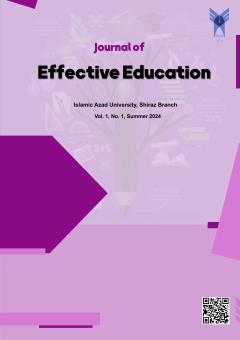راهبردهای کلام امیرالمومنین(علیه السلام) در تعلیم و تربیت با رویکرد فقه حکومتی
الموضوعات :
1 - دانشگاه آزاد اسلامی واحد بابل
2 - دانشگاه آزاد اسلامی واحد بابل، دانشکده الهیات و معارف اسلامی
الکلمات المفتاحية: فقه, فقه حکومتی, تعلیم, تربیت, امام علی علیه السلام,
ملخص المقالة :
مقدمه و هدف: فقه حکومتی در مواجهه با چالشهای عصر حاضر نیازمند تبیین دقیق مبانی خویش است تا بتواند کارآمدی خود را در عرصهها و ابعاد متفاوتی همچون تعلیم و تربیت به اثبات برساند. بر طبق قوانین فقه اسلامی هیچ فردی حق حاکمیت مطلقه برای برپایی قوانین الهی را جز خداوند ندارد، که خداوند این حق را با نصب خلیفه و جانشین به انسانهای برگزیده واگذار میکند. بنابراین تعلیم و تربیت دارای یک نظام طولی است که در رأس آن خداوند، سپس پیامبر و بعد از او امامان قرار دارند. هدف اصلی این تحقیق بررسی راهبردهای کلام حضرت علی(ع) در تعلیم و تربیت بر اساس نگرش فقه حکومتی و بررسی اصول، روش و غایات تعلیم و تربیت در کلام آن بزرگوار میباشد.
روش شناسی پژوهش: این پژوهش توصیفی- تحلیلی است. و با استفاده از ابزار کتابخانهای انجام گرفته شده است.
یافته ها: حضرت علی(ع) در خطبه 34 به چهار حقی که مردم بر حکومت دارند، هدایت گرایی عموم مردم، تعهد حکومت بر تامین رفاه مردم، تعلیم و تربیت بصورت فراگیر، تادیب برای استواری در عمل اشاره نموده است.
نتیجه گیری: برآیند پژوهش حاضر از کلام امیرالمومنین(ع) این است، که رابطه حکومت و مردم یک رابطه متقابل در امر تعلیم و تربیت و شیوه حکمرانی است.
References
Holy Quran
Nahj al-Balagha
Akhwan Nouri, Shaqaig al-Sadat. (2022). The components of professional ethics in education and its functions from the perspective of the Qur'an and hadiths. Master's thesis. University of Quran Sciences and Education(In Persian).
Abdullah zadeh, A. (2023). The importance of Islamic education and the role of the teacher in it. The 7th National Conference on New Researches in Counseling, Educational Sciences and Psychology of Iran, Tehran. (In Persian).
Alam Al-Hoda, Jamila. (2002). The necessity of explaining Islamic education. Methodology of humanities. number 32, 49-33
Arafi, A. (2015). The effects of jurisprudence on the educational system. Culture Strategy, No. 36, 131-113(In Persian).
Baghlani, Farida. (2019). Explanation and analysis of critical thinking in the field of education and criticism of its implications in education based on the teachings of Islamic education. Master's thesis, Payam Noor University, Fars Province, Fasa branch
Bahrani, Ibn Maytham. (1996). Description and translation of Nahj al-Balagha. Tehran: Islamic Research Foundation
Faizul Islam, Ali Naghi. (1989). Translation and explanation of Nahj al-Balagha. Tehran: Faqih Printing and Publications
Jafari, Mohammad Taghi. (2018). Description and translation of Nahj al-Balaghah. Tehran: Islamic Culture Publishing House
Fawzi, Yahya, Karimi Biranvand, Massoud. (2011). the role of government in education; A comparative study of the views of Plato and Imam Khomeini (RA). Islam and educational research. number 1,
Gholami, N,. Mira Ahmadi, M. (2013). Individual jurisprudence and governmental jurisprudence, advantages and disadvantages. Sublime politics. number 4, (In Persian).
Hairi Shirazi, M. (2010), The mission of the clergy in family education. Qurani Kausar. number 40, 110-98(In Persian).
Khomeini, R. (1999). Imam's book Tehran: Imam Khomeini Editing and Publishing Institute(In Persian).
Majlisi, M,T. (1992). Bihar Al-Anwar Beirut: Dar al-Azwa(In Persian).
Makarem Shirazi, Nasser. (2019). The message of Imam Amirul Momineen (peace be upon him). Qom: Islamic Library
Mashkati, Hassan. (2018). What is Islamic education and training? How?. Isfahan: Hello Sepahan
Motahari, M. (1998). Familiarity with Islamic sciences. Tehran: Sadra. (In Persian).
Motahari, M. (2003). Education in Islam. Tehran: Sadra(In Persian).
Mardani Hamdani, F. (2021). Capacities of governmental jurisprudence in forming the development of civilization system. National Conference of Islamic Revolution and Horizon of Future Civilization, Tehran. (In Persian).
Meshkani Sabzevari, Abbas Ali, Meshkani, Abdul Hossein. (2011). An introduction to government jurisprudence from the Supreme Leader's point of view. Islamic government number 60, 184-155
Meshkani Sabzevari, Abbas Ali, Meshkani Sabzevari, Abdul Hossein. (2011). Relations between jurisprudence and government. Islamic government Number 3, 194-173. (In Persian).
Mikailo, Gholamhossein, Sultan al-Qarai, Khalil. (2014). Goals and methods of education from the perspective of Islam. Islamic insight and education. No. 35, 121-97
Mohammadi Poya, F. (2022). Presenting an educational model with the Jihad approach of explanation from the point of view of Nahj al-Balagha. Nahj al-Balagheh research paper. number 40, 24-1(In Persian).
Qadri, Mohammad. (2018). Concept and example of education in Ibn Sina's thought. The 3rd National Conference on Education and Lifestyle Psychology, Qazvin, Payamnoor University, Qazvin branch. (In Persian).
Soleimani Kia, A.(2017). Islamic education and non-Islamic education with a comparative view. The third international conference of psychology, educational and behavioral sciences, Tehran. (In Persian).
Soroush Mahalati, M.(2007). The responsibility of the Islamic government in formal education. Islamic education. number 5, 80-55(In Persian).
Shahab, M. (2021). Criticism of the fundamentals of education and training of the liberalism school with emphasis on the verses and narrations of Fariqin. Master's thesis, Jamia Al-Mustafa Gorgan University. (In Persian).
Site of leadership speeches. https://farsi.khamenei.ir Khamenei 31/6/1991
Zulfaqari, Mohammad, Seydian, Seyyed Mahdi. (2011). government jurisprudence; What, why, how. Political knowledge. number 1, 67-49


